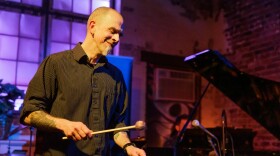Rhythm is at the heart of music. The timekeepers - drummers, bass players and more - provide important context for any piece of music. On their new album Arise, the modern jazz quartet Vipertime emphasize the beat to great success.
The group from Leeds, England formed in 2018 and their debut album Shakedown followed a year later. After playing live (as much as possible) in the ensuing years, saxophonist Ben Powling, bassist Matías Reed and drummers George Hall and Luke Reddin-Williams have tightened their sound on Arise.
Hall and Reddin-Williams fill the canvas of the album with bright, driving high-hat pulses punctuated by rattling snares. The thunder of the full kits are reserved for well-placed moments in the most ecstatic moments of just a few songs.
Playing a variety of tones on bass, from warm and acoustic sounds to distorted rock effects, Reed is locked into the melodic role of the rhythm makers. He’s key to the sudden stops and starts within many of Vipertime’s songs, and also provides chordal structure that keeps listeners from missing the piano heard in most jazz ensembles.
Contributing the melodic ideas of each song, Powling often acts as Vipertime’s fourth member of the rhythm section. His jabbing, one-note patterns build upon the layers of rhythms designed by his bandmates, alternating with shredding runs and aching longer tones.
Powling’s playing is sometimes reminiscent of saxophonist Shabaka Hutchings in their shared love of rhythmic playing. In fact, Hutchings’ band Sons of Kemet is also a two-drummer quartet, but with tuba player Theon Cross providing the bass lines.
Rather than the Afro-centric music of Sons of Kemet, Vipertime finds inspiration from North Africa, India, soulful American spiritual jazz and jarring English post-punk.
Vipertime’s melodies on Arise aren’t sacrificed for the waves of percussion, though each song is enhanced by the intensity of the beat or lack thereof.
The hypnotic, funky drums and bass of “Beatviper” set a marching tempo for Powling to develop a complex but catchy melody that hints at klezmer with a rock edge. Reed even adds guitar to double Powling at the song’s peak.
Franz Von lends his voice to “Head Up,” which settles into a gentle middle section where saxophone gives way to rapped lyrics celebrating musical and personal freedom. Atmospheric guitar notes build on the vibe before the tempo increases to a satisfyingly energetic conclusion.
The longest tune on Arise, “Demise” features Jasmine Myra on alto saxophone as a tightly-connected harmony to Powling’s melody on tenor. Beginning at a ballad pace, Vipertime unveils a compelling theme before switching to a second movevent. Two staccato saxes trade patterns with bass and percussion leading to an uptempo return to the theme and extended solos from Powling and Myra.
A bit of an outlier, “Thumb Claw” is a thumping rock song with four-on-the-floor drumming and Powling playing a melody that would sound great coming from the voice of a rock singer.
Vipertime creates a satisfying blend of unique but accessible music with nice variations in style on Arise. This is a band who sound like they’re having a great time making music, and we think it’s time worth sharing on The New Cool.
The New Cool airs Fridays at 9 p.m., hosted by Abe Beeson and produced by KNKX Public Radio in Seattle, Washington. LISTEN ON DEMAND








